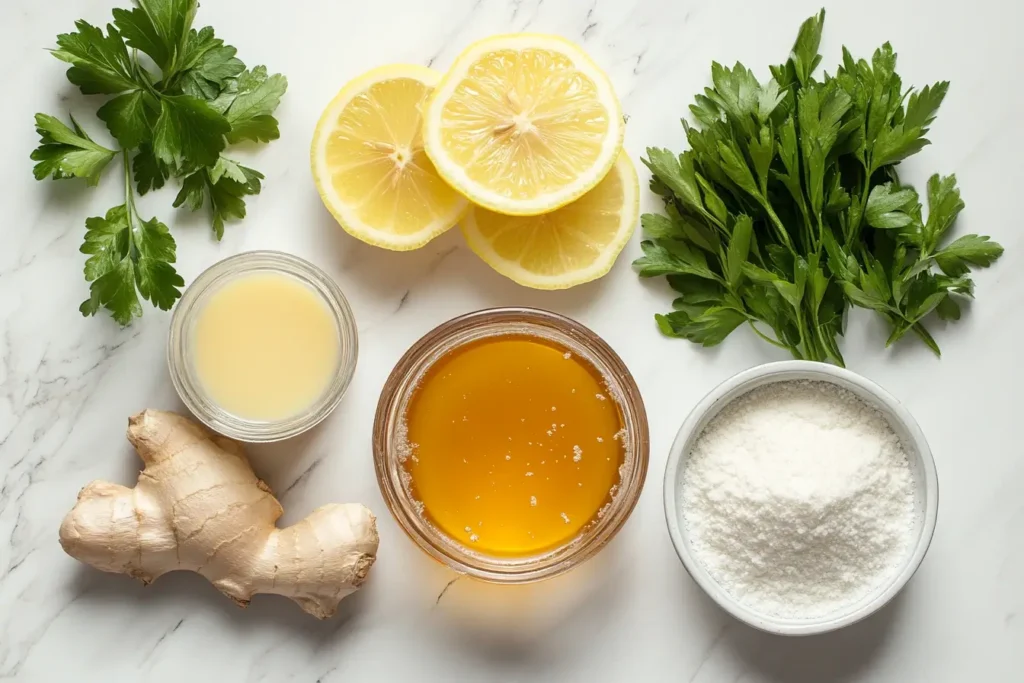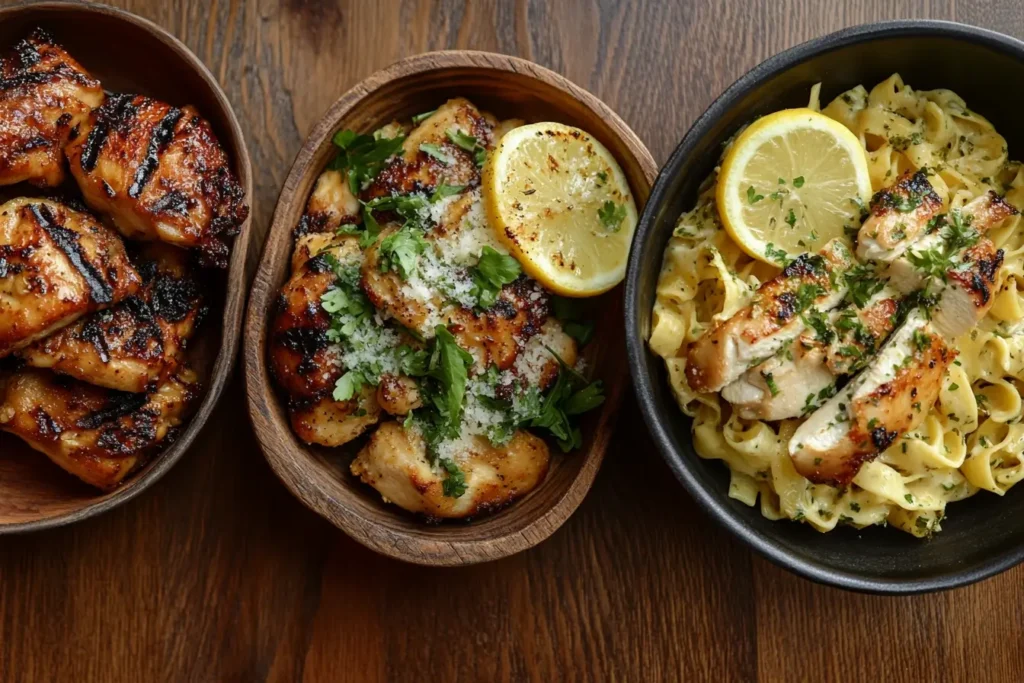Lemon Chicken Sauce Ingredients Explained
Lemon chicken sauce is a deliciously tangy and versatile sauce often used in various cuisines. The sauce is primarily made with a combination of fresh lemon juice, sweeteners, broth or stock, thickening agents, and aromatic seasonings. Each ingredient plays a crucial role in creating the signature balance of tanginess, sweetness, and depth of flavor.

Key Ingredients in Lemon Chicken Sauce:
- Lemon Juice
Freshly squeezed lemon juice is the cornerstone of lemon chicken sauce. It provides the essential tanginess and acidity that defines the sauce. Using fresh lemons ensures a vibrant and authentic citrus flavor compared to bottled juice, which can taste less fresh. - Sweeteners
To balance the acidity of the lemon juice, sweeteners like sugar, honey, or agave syrup are added. Each option provides its own nuance; honey, for instance, adds a slightly floral undertone, while sugar keeps the flavor neutral. - Broth or Stock
Chicken or vegetable broth forms the base of the sauce, giving it a savory depth. A good-quality broth enhances the sauce’s overall flavor and complements the dish. - Thickening Agents
Commonly used agents like cornstarch, flour, or arrowroot powder give the sauce its creamy consistency. These thickeners help bind the ingredients together, making the sauce smooth and velvety. - Aromatics and Flavor Enhancers
Garlic, ginger, and onions are frequently used to add a layer of complexity. Garlic provides a savory punch, ginger adds a hint of spice, and onions contribute a mellow sweetness. - Optional Additions
Ingredients like soy sauce, vinegar, or regional spices can be added for specific variations. For instance, soy sauce introduces an umami-rich profile often seen in Asian-style lemon chicken.
Overview of Lemon Chicken Sauce
Lemon chicken sauce has become a beloved culinary element, enhancing the flavor of both classic and modern dishes. Its history can be traced back to ancient Mediterranean and Asian cuisines, where lemons were highly valued for their versatility and preservation qualities. Over time, the sauce gained popularity in global cuisine, with each culture introducing unique variations and techniques.
In Chinese cuisine, for example, lemon chicken sauce is a staple of Cantonese cooking. It’s typically sweetened and served over crispy fried chicken. Meanwhile, Mediterranean-style lemon sauces often incorporate olive oil and fresh herbs like rosemary or thyme. This adaptability has made the sauce a favorite in kitchens worldwide.
Essential Ingredients in Lemon Chicken Sauce
Let’s take a closer look at some essential ingredients and why they’re indispensable for making the perfect lemon chicken sauce:
Lemon Juice: The Tangy Foundation
The primary reason fresh lemon juice is preferred is its bright, zesty flavor. Unlike bottled versions, fresh lemon juice contains natural oils and aromas that elevate the sauce. It also contributes a healthy dose of Vitamin C and antioxidants, making the sauce not just flavorful but also nutritious.
Sweeteners: Achieving Balance
Sweeteners are necessary for counteracting the sharp acidity of lemons. Depending on your preference, you can use refined sugar for a neutral sweetness, honey for a floral undertone, or agave syrup for a vegan-friendly alternative. The key is to strike the perfect balance where neither sweetness nor tartness overpowers the other.
Broth or Stock: Adding Depth
A flavorful broth transforms the sauce into something extraordinary. Chicken broth is most commonly used, as it pairs seamlessly with the meat, but vegetable broth can be substituted for a vegetarian-friendly option.
Thickening Agents: Perfecting the Consistency
Without a thickening agent, the sauce may turn out watery and fail to coat the chicken properly. Cornstarch is the most popular choice due to its neutral flavor and ability to create a glossy finish. Arrowroot powder is another excellent alternative for those seeking a gluten-free option.
Aromatics and Enhancers
Adding minced garlic, grated ginger, or chopped onions can take the flavor to the next level. Each ingredient contributes its own unique notes—garlic adds depth, ginger lends a slight warmth, and onions balance everything with their natural sweetness.
Optional Ingredients for Flavor Customization
For those who enjoy experimenting with flavors, lemon chicken sauce can be personalized in endless ways. Soy sauce adds saltiness and umami, while a splash of vinegar can boost the tangy profile. Herbs like dill, parsley, or cilantro can give the sauce a fresh finish. For a spicier variation, crushed red pepper flakes or cayenne can be incorporated.
This adaptability is what makes lemon chicken sauce a favorite for home cooks and chefs alike. You can easily modify the recipe to suit your personal tastes or the type of dish you’re preparing.
Preparing Lemon Chicken Sauce
Step-by-Step Guide
Making lemon chicken sauce is a straightforward process that requires only a few basic ingredients and kitchen tools. Whether you’re a novice in the kitchen or an experienced cook, this guide will help you achieve a sauce with perfect consistency and a well-balanced flavor.
Ingredients You’ll Need:
- 1/3 cup fresh lemon juice (about 2-3 lemons)
- 1 cup chicken or vegetable broth
- 2 tablespoons sugar (or honey/agave syrup for natural sweetness)
- 1 tablespoon cornstarch (or arrowroot powder for gluten-free options)
- 2 cloves garlic, minced
- 1 teaspoon grated ginger (optional)
- 2 tablespoons soy sauce (optional, for added umami)
- 1 tablespoon butter (optional, for richness)
- Salt and black pepper to taste
Instructions:
- Prepare the Ingredients:
Start by juicing fresh lemons to ensure a vibrant, zesty flavor. Mince garlic and grate ginger if using them as aromatics. Measure out all ingredients so they’re ready to go. - Create the Base:
In a small saucepan over medium heat, combine the lemon juice, chicken broth, and sugar. Stir the mixture well to dissolve the sugar completely. - Add Aromatics:
Add minced garlic and grated ginger to the saucepan. Allow the mixture to simmer for 2-3 minutes to let the flavors infuse. - Thicken the Sauce:
In a separate bowl, mix the cornstarch with 2 tablespoons of cold water to create a slurry. Gradually pour this into the simmering sauce while whisking constantly. This ensures the sauce thickens evenly without forming lumps. - Adjust the Flavor:
Taste the sauce and adjust seasoning. Add soy sauce for an umami boost, a pinch of salt for balance, or additional sweetener if the sauce is too tangy. Stir in butter for a creamy texture, if desired. - Simmer and Serve:
Let the sauce simmer gently for another 2-3 minutes, stirring frequently. Once it reaches your desired consistency, remove it from heat. Serve immediately over cooked chicken or store it for later use.
Tips for Achieving Perfect Consistency
Consistency is one of the most critical aspects of lemon chicken sauce. Follow these expert tips to ensure your sauce turns out perfectly every time:
- Use the Right Thickener:
Cornstarch is ideal for achieving a glossy finish, but arrowroot powder is an excellent alternative if you’re aiming for a gluten-free recipe. Avoid overusing thickeners, as they can make the sauce too gummy. - Mix Thoroughly:
Always whisk the cornstarch slurry before adding it to the hot liquid. This prevents clumps and ensures an even texture. - Cook at the Right Temperature:
Simmer the sauce gently. High heat can cause the cornstarch to break down, leading to a runny consistency. - Avoid Over-Thickening:
Remember that the sauce will thicken further as it cools. Remove it from heat once it’s slightly thinner than your desired consistency. - Reheat Properly:
If reheating the sauce, add a splash of water or broth to thin it out, as it may become too thick after cooling.
Variations of Lemon Chicken Sauce

One of the best things about lemon chicken sauce is its versatility. Depending on the ingredients and techniques used, you can create a range of flavor profiles to suit different cuisines and dishes. Here are some popular variations:
Chinese Lemon Chicken Sauce
Chinese-style lemon chicken sauce is typically sweeter and glossier than other versions. It often incorporates ingredients like soy sauce, rice vinegar, and sugar, giving it a distinct umami flavor. This variation is commonly served over battered and fried chicken, creating a delicious sweet-and-sour contrast.
How to Make It:
To achieve this version, add 1 tablespoon of soy sauce, 1 teaspoon of rice vinegar, and an additional tablespoon of sugar to the base recipe. Garnish the dish with sesame seeds or green onions for an authentic Chinese presentation.
Mediterranean Lemon Sauce
Mediterranean-style lemon sauce is inspired by the region’s emphasis on fresh herbs and olive oil. This version is often paired with grilled chicken, fish, or vegetables, making it a lighter option.
How to Make It:
Substitute butter with extra-virgin olive oil, and add fresh herbs like rosemary, thyme, or parsley. You can also include a dash of white wine for a sophisticated flavor.
Creamy Lemon Chicken Sauce
For a richer, creamier take, cream or butter is added to the base. This version pairs exceptionally well with pasta or mashed potatoes, giving the dish a decadent texture.
How to Make It:
Add 1/4 cup of heavy cream and 1 tablespoon of butter to the sauce during the final simmer. Stir until fully combined, and season with salt and pepper to taste.
Spicy Lemon Chicken Sauce
If you’re a fan of bold flavors, adding heat to lemon chicken sauce can elevate the dish. This spicy variation works well with grilled or roasted chicken.
How to Make It:
Incorporate 1/2 teaspoon of crushed red pepper flakes, a dash of cayenne pepper, or finely chopped chili peppers into the sauce. Adjust the spice level to suit your taste.
Common Mistakes and How to Avoid Them
Even the simplest recipes can go wrong if certain precautions are not taken. Here are some common mistakes when making lemon chicken sauce and tips on how to avoid them:
- Overpowering Lemon Flavor:
If the sauce tastes too tangy, it likely has too much lemon juice. Balance the flavor by adding more broth, sweeteners, or a touch of cream. - Incorrect Consistency:
Watery or overly thick sauce often results from improper use of thickening agents. Measure carefully, and always mix cornstarch or flour with cold water before adding it to the sauce. - Burning the Sauce:
Cooking the sauce over high heat or leaving it unattended can lead to burning. Always simmer gently and stir regularly.
Pairing Lemon Chicken Sauce with Dishes
Lemon chicken sauce’s versatility makes it a perfect match for a variety of dishes. Whether you’re preparing a hearty chicken entrée or looking for a lighter pairing, this sauce adapts beautifully to suit your needs. Below, we’ll explore the best types of chicken cuts, ideal side dishes, and even vegetarian options that complement this tangy sauce.

Best Types of Chicken to Use
Choosing the right cut of chicken can elevate your dish and enhance the flavors of the lemon sauce. Here are some options to consider:
Chicken Breast
Boneless, skinless chicken breasts are a classic choice for lemon chicken dishes. Their mild flavor allows the sauce to shine, and they cook quickly, making them ideal for weeknight meals. To avoid dryness, be sure to sear the chicken breast on high heat first, then finish cooking it gently in the sauce.
Chicken Thighs
For a juicier and more flavorful alternative, chicken thighs are an excellent option. Their higher fat content makes them less prone to drying out, and they pair beautifully with the tangy and savory notes of lemon chicken sauce. Thighs can be cooked bone-in or boneless, depending on your preference.
Bone-In Chicken
If you’re looking to make a more rustic dish, consider using bone-in cuts like drumsticks or thighs. The bones impart extra flavor to the meat during cooking and make the dish more visually appealing. Bone-in chicken is particularly suited for slow-cooking methods, allowing the flavors of the sauce to meld deeply with the meat.
Breaded or Fried Chicken
For those who prefer a crispy texture, breaded or fried chicken is a great match for lemon chicken sauce. The sauce can be drizzled over the crispy chicken right before serving, creating a delightful contrast between the crunch of the chicken and the silky texture of the sauce.
Ideal Side Dishes
Pairing lemon chicken with the right sides can turn it into a complete meal. Here are some complementary side dishes that enhance the dish’s flavors:
Rice and Grains
Steamed white rice, jasmine rice, or even wild rice is an ideal pairing for lemon chicken. The rice absorbs the sauce, ensuring no drop is wasted. For a healthier option, try quinoa or farro, which add a nutty flavor that complements the tanginess of the sauce.
Roasted Vegetables
Oven-roasted vegetables such as asparagus, zucchini, carrots, or Brussels sprouts are perfect companions. Their natural sweetness balances the sauce’s acidity, while their roasted flavors add depth to the meal.
Pasta
Lemon chicken sauce pairs beautifully with pasta, particularly angel hair or fettuccine. Toss the pasta directly in the sauce for a creamy, tangy pasta dish that’s quick and satisfying.
Mashed or Roasted Potatoes
Creamy mashed potatoes or crispy roasted potatoes serve as hearty sides that soak up the sauce’s rich flavors. The combination of the velvety potatoes and the bright, zesty sauce is irresistible.
Green Salads
For a lighter pairing, a simple green salad with a lemon vinaigrette echoes the flavors of the dish without overpowering it. Add ingredients like arugula, spinach, or mixed greens with a sprinkle of Parmesan for extra flavor.
Other Proteins and Vegetarian Options
Lemon chicken sauce isn’t just limited to chicken. Its tangy and adaptable profile makes it suitable for other proteins and vegetarian alternatives.
1. Fish and Seafood
White fish like cod, tilapia, or halibut works exceptionally well with lemon chicken sauce. You can use the sauce as a topping or bake the fish directly in the sauce. Shrimp and scallops are also fantastic options, as their sweetness balances the tartness of the lemon.
2. Tofu and Tempeh
For a vegetarian option, firm tofu or tempeh can be used as the main protein. Simply pan-fry or bake the tofu and then toss it in the sauce for a satisfying meat-free dish. Tempeh’s nutty flavor provides an extra layer of complexity.
3. Roasted Cauliflower or Eggplant
If you’re looking for a vegetable-forward option, roasted cauliflower steaks or baked eggplant slices can be dressed with lemon chicken sauce for a flavorful, low-carb meal.
4. Chickpeas and Lentils
Cooked chickpeas or lentils provide a hearty plant-based option. When simmered in the sauce, they absorb its tangy flavor, creating a protein-packed vegetarian dish.
Frequently Asked Questions About Lemon Chicken Sauce
Here are answers to some commonly asked questions to help you better understand and utilize this flavorful sauce:
Can Lemon Chicken Sauce Be Made Ahead of Time?
Yes, lemon chicken sauce can be made ahead of time and stored for later use. Prepare the sauce and allow it to cool completely before transferring it to an airtight container. It can be refrigerated for up to 3 days or frozen for up to 2 months. Reheat gently on the stovetop, adding a splash of broth if it becomes too thick.
Is Lemon Chicken Sauce Gluten-Free?
Lemon chicken sauce can easily be made gluten-free by using cornstarch or arrowroot powder as the thickening agent instead of flour. Additionally, check that any optional ingredients, like soy sauce, are gluten-free.
Can I Make It Without Sweeteners?
Yes, you can omit the sweeteners if you prefer a purely tangy sauce. However, the lack of sweetness may make the sauce overly acidic. Consider balancing the flavor with a touch of extra broth or a small amount of cream instead.
Conclusion
Lemon chicken sauce is a versatile, flavorful addition to your culinary repertoire. Whether you’re preparing it for a classic chicken dish, adapting it for Mediterranean or Asian flavors, or using it with vegetarian proteins, this sauce is sure to impress. By following the steps and tips outlined here, you can achieve a perfectly balanced sauce every time.
